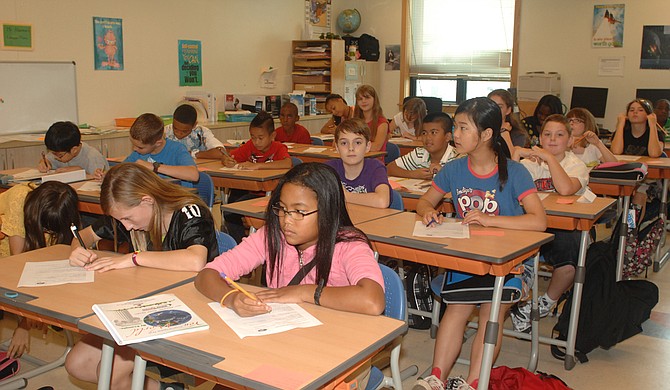About one in four Mississippi third graders failed a toughened reading test on the first try this spring, leaving it unclear if they will advance to fourth grade. This file photo, not related to school testing, is courtesy Flickr/USAG Humpreys
JACKSON, Miss. (AP) — About one in four Mississippi third graders did not pass a toughened reading test on the first try this spring, results released Wednesday by the Mississippi Department of Education show, leaving it unclear if they will advance to fourth grade.
Mississippi is one of 16 states that demand third grade students pass a reading score threshold or flunk, with Nevada and Michigan imposing such requirements in the next two years. Mississippi raised its threshold this year, mandating students reach the middle of five scoring levels, which officials describe as "approaching grade level expectations." From 2015, the first year the requirement was implemented, until last year, students only had to reach the second lowest achievement level, called "basic."
Wright was the prime mover in increasing the threshold, a move the Legislature approved in 2016. She had long been uncomfortable that students who remained far from proficient were allowed to advance.
"I think we have to hold the bar high," Wright told reporters Wednesday. "Children's lives depend on it."
Of 35,000 students, nearly 9,000 did not pass the test. The Chickasaw County school district had the top share of passing third graders at 94%, while Yazoo City was lowest at 32%. The state is taking over Yazoo City on June 1 as part of its achievement school district aimed at improving performance. The districts that performed the worst were typically small, rural, poor and overwhelmingly African American, places that struggle to attract good teachers.
Students had a second chance last week, although those results aren't yet available. Students get a third chance to advance later this summer, after districts finish up summer school. About 3% of students were allowed to advance last year without passing for various reasons.
By comparison, 15% of students did not pass the first round of testing in 2015, with 8% ultimately forced to repeat third grade. Students repeating third grade are supposed to receive intensive tutoring from highly qualified teachers.
Officials had predicted passing rates would drop from last year's 93.8%, when students had to reach the second level. However, Kymona Burk, until recently the state literacy director, had told The Associated Press earlier this year that officials were hoping as many as 80% would pass.
Wright counted it as a victory that 74.5% of students reached the third level this year, up from 73.8% last year.
"I can't say enough about how proud I am of the work that teachers have done," Wright said.
Only reading scores are available for the test now, and Wright says that once writing scores come in, some additional third graders could shift to the passing column. She says she expects full results to show that the share of students scoring at proficient and above has continued to increase.
Mississippi is paying for literacy coaches to help improve instruction in 182 of 420 schools statewide with a third grade. The state also has provided training on teaching reading to 13,000 people, and provides extra money for summer schools for struggling readers.
The Republican policymakers who adopted Mississippi's plan from Florida support it, also pointing to improvements in performance on a nationwide test. At least one independent study of Florida has found benefits uncertain.
"Making sure children can read before being socially promoted is critical," Gov. Phil Bryant said in a statement. "I will continue to make sure our students are put in a position to succeed and that means setting high expectations."
Bryant, who says he is "glad" that three-fourths of students passed, was a prime mover in the law's original adoption.
Editor's note: We have updated this story to delete the Associated Press' language about third-graders "failing" to pass a state test. We believe that language is harmful to our children.
Copyright Associated Press. All rights reserved. This material may not be published, broadcast, rewritten, or redistributed.



Comments
Use the comment form below to begin a discussion about this content.
comments powered by Disqus